Unit4_earthquake
unit4 Earthquake(知识点)
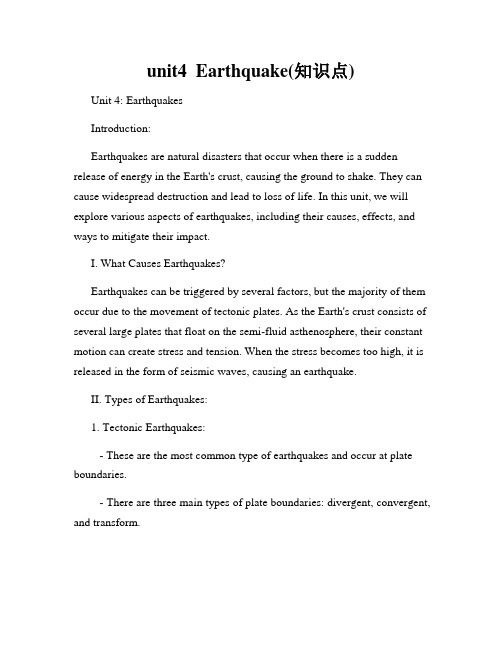
unit4 Earthquake(知识点)Unit 4: EarthquakesIntroduction:Earthquakes are natural disasters that occur when there is a sudden release of energy in the Earth's crust, causing the ground to shake. They can cause widespread destruction and lead to loss of life. In this unit, we will explore various aspects of earthquakes, including their causes, effects, and ways to mitigate their impact.I. What Causes Earthquakes?Earthquakes can be triggered by several factors, but the majority of them occur due to the movement of tectonic plates. As the Earth's crust consists of several large plates that float on the semi-fluid asthenosphere, their constant motion can create stress and tension. When the stress becomes too high, it is released in the form of seismic waves, causing an earthquake.II. Types of Earthquakes:1. Tectonic Earthquakes:- These are the most common type of earthquakes and occur at plate boundaries.- There are three main types of plate boundaries: divergent, convergent, and transform.- Divergent boundaries occur where plates move apart, while convergent boundaries occur where plates collide. Transform boundaries occur where plates slide past each other horizontally.- The intensity and magnitude of tectonic earthquakes vary depending on factors such as the type of boundary and the amount of accumulated stress.2. Volcanic Earthquakes:- Volcanic activity can also lead to earthquakes.- When magma rises to the surface, it can cause the surrounding rocks to crack, resulting in volcanic earthquakes.- These earthquakes are usually localized around the volcano and are associated with volcanic eruptions.3. Induced Earthquakes:- Human activities can sometimes trigger earthquakes.- Activities such as mining, reservoir-induced seismicity (due to filling of large reservoirs), and hydraulic fracturing (fracking) can induce seismic events.- Induced earthquakes may occur in areas where the Earth's crust is already under stress.III. Earthquake Effects:1. Surface Effects:- Shaking of the ground during an earthquake can cause various surface effects.- Buildings and infrastructure may collapse or suffer severe damage, leading to injuries and loss of life.- Landslides, ground cracks, and changes in the landscape can also occur.2. Secondary Effects:- Earthquakes can trigger secondary effects such as tsunamis, which are large ocean waves generated by the displacement of water.- Fires may break out due to damaged electrical systems or ruptured gas pipelines.- The movement of the ground can also lead to liquefaction, where saturated soil temporarily loses its strength and behaves like a liquid.IV. Mitigating Earthquake Impact:1. Preparedness:- Education and public awareness are crucial for earthquake preparedness.- Communities should have disaster response plans, evacuation routes, and emergency supplies in place.- Conducting regular drills and training sessions can help people understand the appropriate actions to take during an earthquake.2. Building Design:- Constructing buildings and infrastructure that can withstand seismic forces is essential.- Engineers use various techniques, such as base isolation and dampers, to reduce the impact of earthquakes on structures.- Building codes and regulations should be followed to ensure safety standards are met.3. Early Warning Systems:- Advances in technology have made it possible to develop early warning systems for earthquakes.- These systems can detect initial seismic waves and provide a few seconds to minutes of warning before the more destructive waves arrive.- Early warning can help prompt evacuations and give people time to take cover.Conclusion:Earthquakes are powerful natural phenomena that can have devastating consequences. By understanding their causes, effects, and implementing effective mitigation strategies, we can work towards minimizing the impact of earthquakes and protecting lives and infrastructure. Increased public awareness and preparedness are vital in ensuring resilience against these unpredictable yet recurring events.。
高一英语必修一Unit4Earthquakes知识点讲解和练习

1、关系代词which用来指物,在从句中可作主语或宾语。
This is a book which tells about space rocket technology.(作主语)
The letter which I received yesterday was from my brother.(作宾语)
【归纳总结】
give out分发;发出;用完give sth.away赠送;颁发;泄露
give back归还;复原givein呈上;倒戈,屈服,认输
give off发出,放出give over停止,中止
give up放弃give on to/onto sth.朝向,面对;通向
8、Your speech was heard by a group of fivejueges,all of whom agreed that it was thebest one this year.
易混词
辨析
例句
injury
多指意外事故受伤。比hurt正式,hurt多指伤痛,而injure则指损害健康、成就、容貌等,强调功能的损失。
A bullet injured his lefgt eye.
hurt
既可指肉体上的损害,也可指精神上、感情上的损害;作不及物动词,意为“(身体某部位)难受”。指肉体上的损害时,hurt可与badly,slightly,seriously等连用,但若指精神上的创伤,只能说very much/rather/deeply hurt。
(1)n.裁判员;法官;审判员
His father used to be a judge.他的父亲过去是一名法官。
(2)v.推断;断定
人教高中英语必修一unit4Earthquake课文翻译
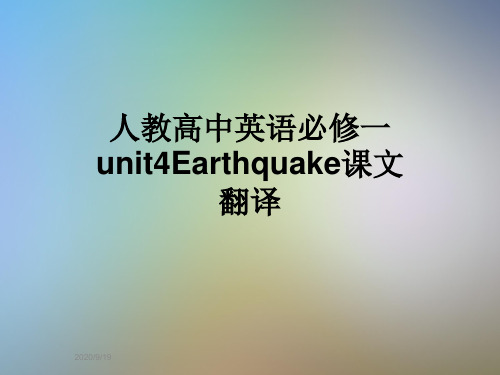
即使天空没有飞机,在唐山城外也可以听到飞机声。
In the city, the water pipes in some buildings cracked and burst. 在市内,有些建筑物里的水管爆裂开来。
所有的市内医院、75%的工厂和建筑物、90%的家园都消失了。
Bricks covered the ground like red autumn leaves.
残砖就像秋天的红叶覆盖着大地,
No wind, however, could blow them away.
然而它们是不可能被风刮走的。
Two dams fell and most of the bridges also fell or were not safe for traveling. 两座大坝垮了,多数桥梁不是塌了就是无法安全通行了。
Two-thirds of them died or were injured during the earthquake. 2/3的人在地震中死去或受伤。
Thousands of families were killed and many of them were left without parents
三天来,村子里的井水升升降降,起起伏伏。 Farmers noticed that the well walls had deep cracks in them.
农夫注意到,水井的井壁上有深深的裂缝,
A smelly gas came out of the cracks. 裂缝里冒出臭气。
人教版英语必修一Unit 4 Earthquake知识点总结详解整理
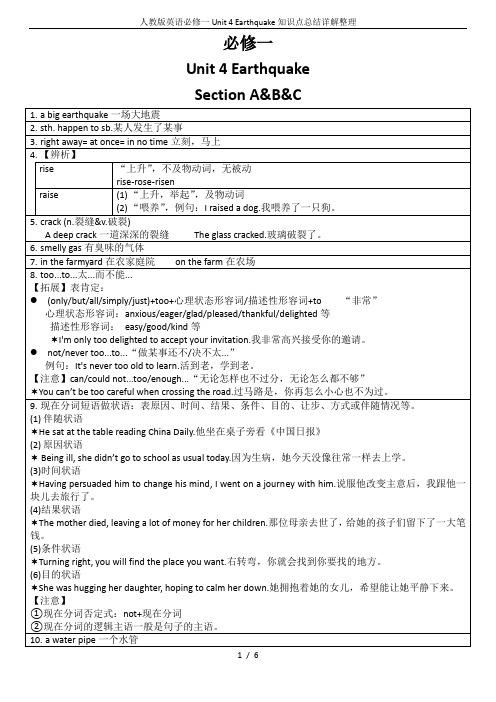
必修一Unit 4 Earthquake Section A&B&C11.burst➢v.(使)爆裂;(使)膨胀;爆发;burst-burst-burstThe water pipe cracked and burst.➢n.突发,爆发✶There was a burst of laughter in the next room.隔壁房间里突然爆发出一阵笑声。
➢v.猛冲;突然出现✶He burst into the room without knocking.他没敲门就闯进了房间。
【拓展】●burst into+名词=burst out doing 突然...起来✶burst into tears=burst out crying 突然哭起来/ burst into laughter=burst out laughing突然笑起来●burst in闯进●be bursting with充满;爆满✶The roads are bursting with cars.车辆把那些道路挤满了。
● a burst of (突然)一阵lion百万【用法】one million一百万several million几百万a dozen million一千两百万millions of+名词几百万...【其他数字用法】tens of thousands of...数以万计的...hundreds of thousands of...几十万【其他表示数字的词】dozen一打(十二) score(二十)13.event n.(1)事件;(尤指)大事●current/the latest events当前事件/最新事件(2)(体育比赛等的)项目,赛事●one of the major sporting events of the year年度重大体育赛事之一【辨析】event 重要事件;比赛项目The Asian Games were one of the major sporting eventsof the year.亚运会是年度重大体育赛事之一。
高一(上)英语必修一Unit4_Earthquakes重点单词短语归纳整理
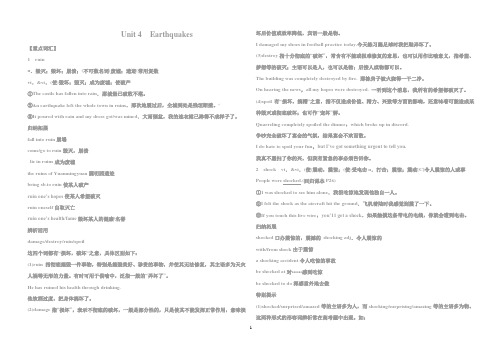
Unit 4 Earthquakes【重点词汇】1 ruinn.毁灭;毁坏;崩溃;(不可数名词)废墟;遗迹(常用复数vt.&vi.(使)毁坏;毁灭;成为废墟;使破产①The castle has fallen into rain.那城堡已破败不堪。
②An earthquake left the whole town in ruins.那次地震过后,全城到处是残垣断壁。
…③It poured with rain and my dress got/was mined.大雨倾盆,我的连衣裙已淋得不成样子了。
归纳拓展fall into ruin崩塌come/go to ruin毁灭,崩溃lie in ruins成为废墟the ruins of Yuanmingyuan圆明园遗迹bring sb.to ruin使某人破产ruin one‟s hopes使某人希望破灭ruin oneself自取灭亡ruin one‟s health/fame毁坏某人的健康/名誉辨析活用damage/destroy/ruin/spoil这四个词都有“损坏,破坏”之意,具体区别如下:(1)ruin指彻底摧毁一件事物,特别是摧毁美好、珍贵的事物,并使其无法修复,其主语多为天灾人祸等无形的力量。
有时可用于借喻中,泛指一般的“弄坏了”。
He has ruined his health through drinking.他饮酒过度,把身体搞坏了。
(2)damage指“损坏”,表示不彻底的破坏,一般是部分性的,只是使其不能发挥正常作用,意味损坏后价值或效率降低,宾语一般是物。
I damaged my shoes in football practice today.今天练习踢足球时我把鞋弄坏了。
(3)destroy指十分彻底的“破坏”,常含有不能或很难修复的意思,也可以用作比喻意义,指希望、梦想等的破灭;主语可以是人,也可以是物;后接人或物都可以。
Unit4 Earthquake知识点以及定语从句精讲

Unit4 Earthquake一:重点单词短语1.Now imagine there has been a big earthquake. 现在,假设有一次大地震。
(1)sth. happen to. sb.某事发生在某人身上Did you hear what happened to David last night? 你听说大卫昨天晚上发生什么事了吗?(2)happen to do sth.碰巧做某事I happened to see Peter on the way to the bookstore yesterday.昨天我去书店的路上碰巧遇见了彼得。
(3)It (so) happened that…碰巧......It so happened that I saw Peter on the way to the bookstore yesterday.昨天我去书店的路上碰巧遇见了彼得。
2. Imagine your home begins to shake and you must leave it right away.shake(v.) (shook, shaken)摇动,震动eg: Shake the bottle before taking the medicine. 服药之前将药瓶摇一摇。
使受震撼;使(信念等)动摇eg: They were badly shaken by the news of her death. 她死的消息令他们大为震惊。
(指人)打颤,颤抖eg: She was shaking with cold/laughter/fear/anger.shake(n.) (C 常用单数)摇动,震动eg: a shake of the head 摇头拓展:shake hands with sb. = shake sb. by the hand = shake sb's hand 与某人握手shake one's head 摇头3. For three days the water in the village rose and fell, rose and fell.rise(vi.) “升起,升高”,其后不能接宾语,不能用于被动语态。
人教高中英语 必修一 unit4Earthquake课文翻译

即使天空没有飞机,在唐山城外也可以听到飞机声。
In city, the water pipes in some buildings cracked and burst. 在市内,有些建筑物里的水管爆裂开来。
Half a million pigs and millions of chickens were dead.
50万头猪和几百万只鸡全都死了。 Sand now filled the wells instead of water.
井里满是沙子,而不是水。 People were shocked. 人们惊呆了。
It seemed as if the world was at an end! 世界似乎到了末日!
Eleven kilometers directly below the city the greatest earthquake of the 20th century had begun.
二十世纪最大的一次地震就在唐山市正下方11公里处发生了。 It was felt in Beijing, which is more than two hundred kilometers away.
Then, later that afternoon, another big quake which was almost as strong as the first one shook Tangshan.
接着,在下午晚些时候,又一次和第一次一样的强烈的地震震撼着唐山。
Unit4 Earthquake地震讲稿
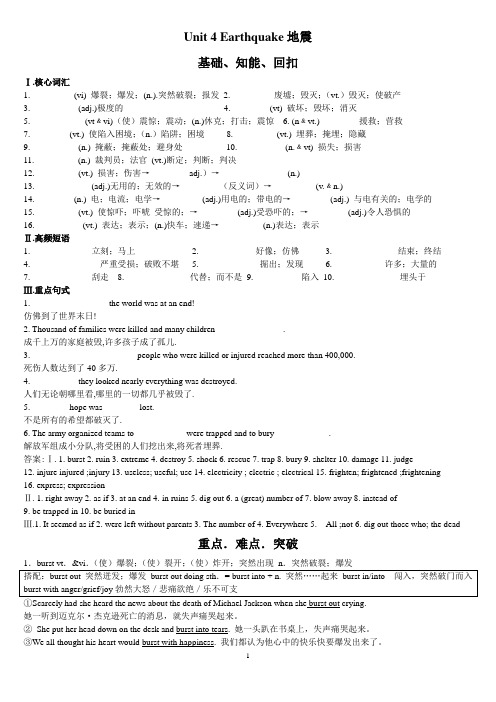
Unit 4 Earthquake地震基础、知能、回扣Ⅰ.核心词汇1.__________(vi) 爆裂;爆发;(n.).突然破裂;报发2.__________废墟;毁灭;(vt.)毁灭;使破产3.___________(adj.)极度的4._________(vt) 破坏;毁坏;消灭5.____________ (vt﹠vi)(使)震惊;震动;(n.)休克;打击;震惊6. (n﹠vt.)_________援救;营救7._________(vt.) 使陷入困境;(n.)陷阱;困境8.__________(vt.) 埋葬;掩埋;隐藏9.___________(n.) 掩蔽;掩蔽处;避身处10.___________(n.﹠vt) 损失;损害11.__________(n.) 裁判员;法官(vt.)断定;判断;判决12.__________(vt.) 损害;伤害→_________adj.)→_______________ (n.)13._____________(adj.)无用的;无效的→_________(反义词)→__________(v.﹠n.)14._________(n.) 电;电流;电学→_________ (adj.)用电的;带电的→_________(adj.) 与电有关的;电学的15.__________(vt.) 使惊吓;吓唬受惊的;→_________(adj.)受恐吓的;→_________(adj.)令人恐惧的16.___________(vt.) 表达;表示;(n.)快车;速递→__________(n.)表达;表示Ⅱ.高频短语1._____________ 立刻;马上2.____________ 好像;仿佛3.______________ 结束;终结4._______________ 严重受损;破败不堪5._____________ 掘出;发现6.___________ 许多;大量的7._____________ 刮走8.______________ 代替;而不是9.__________ 陷入10.___________ 埋头于Ⅲ.重点句式1.__________________the world was at an end!仿佛到了世界末日!2. Thousand of families were killed and many children _______________.成千上万的家庭被毁,许多孩子成了孤儿.3. ________________________people who were killed or injured reached more than 400,000.死伤人数达到了40多万.4. __________ they looked nearly everything was destroyed.人们无论朝哪里看,哪里的一切都几乎被毁了.5. ________ hope was ________lost.不是所有的希望都破灭了.6. The army organized teams to ___________ were trapped and to bury ____________.解放军组成小分队,将受困的人们挖出来,将死者埋葬.答案:Ⅰ.1. burst 2. ruin 3. extreme 4. destroy 5. shock 6. rescue 7. trap 8. bury 9. shelter 10. damage 11. judge12. injure injured ;injury 13. useless; useful; use 14. electricity ; electric ; electrical 15. frighten; frightened ;frightening 16. express; expressionⅡ. 1. right away 2. as if 3. at an end 4. in ruins 5. dig out 6. a (great) number of 7. blow away 8. instead of9. be trapped in 10. be buried inⅢ.1. It seemed as if 2. were left without parents 3. The number of 4. Everywhere 5. All ;not 6. dig out those who; the dead重点.难点.突破Scarcely had she heard the news about the death of Michael Jackson when she burst out crying.她一听到迈克尔·杰克逊死亡的消息,就失声痛哭起来。
- 1、下载文档前请自行甄别文档内容的完整性,平台不提供额外的编辑、内容补充、找答案等附加服务。
- 2、"仅部分预览"的文档,不可在线预览部分如存在完整性等问题,可反馈申请退款(可完整预览的文档不适用该条件!)。
- 3、如文档侵犯您的权益,请联系客服反馈,我们会尽快为您处理(人工客服工作时间:9:00-18:30)。
damages
Para 4
recovery
Fill in the blanks
Main Idea Details Strange •________ things were happening in the countryside in northeast Hebei. rose •The water in the wells ____ and fell ______. smelly •A _______ gas came out of the cracks. •The chickens and pigs were too nervous ________ eat to _____. • Fish jumped ________out of the bowls and ponds. •Mice _____ out of the fields. ran •At ______ am on July 28, 1976, people 3:00 bright _______ saw ________ lights in the sky.
Damage caused by earthquake Para. 2-3
Para. 2-3
Data(数据)
of the nation felt the earthquake .
1/3 15 2/3
A huge crack that was
30
In
8
kilometres long and
metres wide cut across houses. terrible seconds a large city lay in ruins.
signs before Earthquake Para.1
Fill in the blanks Main Idea Details
3:42 greatest • At _____ am, the __________ earthquake of the 20th century began . Steam •_______ burst from holes in the ground. dirt •Hard hills of the rock became rivers of ____. Bricks •________ covered the ground like red autumn leaves. dams • Two _______ and most of the bridges fell. • The railway tracks were now useless steel _________pieces of _______. Sand •______ now filled the wells instead of water. •Water,food,andelectricity ______________ were hard
of the people died or were injured during the earthquake.
The number of people who were killed or injured reached more than 400,000 .
All of the city’s hospitals, 75% of its factories _ and buildings and 90% of its homes were gone.
Discussion (3m)
Discussion
What shall we do if an earthquake happens?
Don’t
be nervous and keep calm. • Don’t try to run out of the classroom. • Protect your head by putting your bag on your head. • Squat or sit down under your desk. • Leave the classroom after the earthquake.
injure
fall down
burst destroy
lay in ruins
Earthquake
Buried in bricks
cut off
crack
People , injured ,buried in bricks. 受伤的
The city lay in ruins.
destroy
burst
Unit4
Mr. Nature
emotional
(情绪化的)
Natural Disasters
Natural Disasters
flood
Typhoon
drought
hurricane
fire
sandstorm
mudflow
泥石流
volcano eruption
火山爆发
Earthquake
A NIGHT
THE EARTH DIDN’T SLEEP
Reading-I----fast reading (2m)
Fast reading
What does the passage mainly talk abouห้องสมุดไป่ตู้?
An earthquake happened in Tangshan in 1976
Part 3: para 4
Sum up the main idea of each paragraph. (use oneReading-III----detailed reading (5m) word to describe it)
Para1
Para 2&3
Detail reading
signs
Reading-II----scanning (2m)
Sum up the main idea of each part of the passage.
(use one word to describe) Part 1: para 1 Part 2: para 2&3 signs damage recovery
Which disaster may cause the worst damage? Discussion:
What damage will an
earthquake cause
?
What damage?
People, the buildings, the roads, water pipes(水管), electricity…
earthquake fire flood volcano eruption tsunami Natural Disasters 海啸 mudflow 泥石流 drought
sandstorm typhoon
(hurricane)
landslide 山体滑坡 avalanche tornado龙卷风 雪崩
